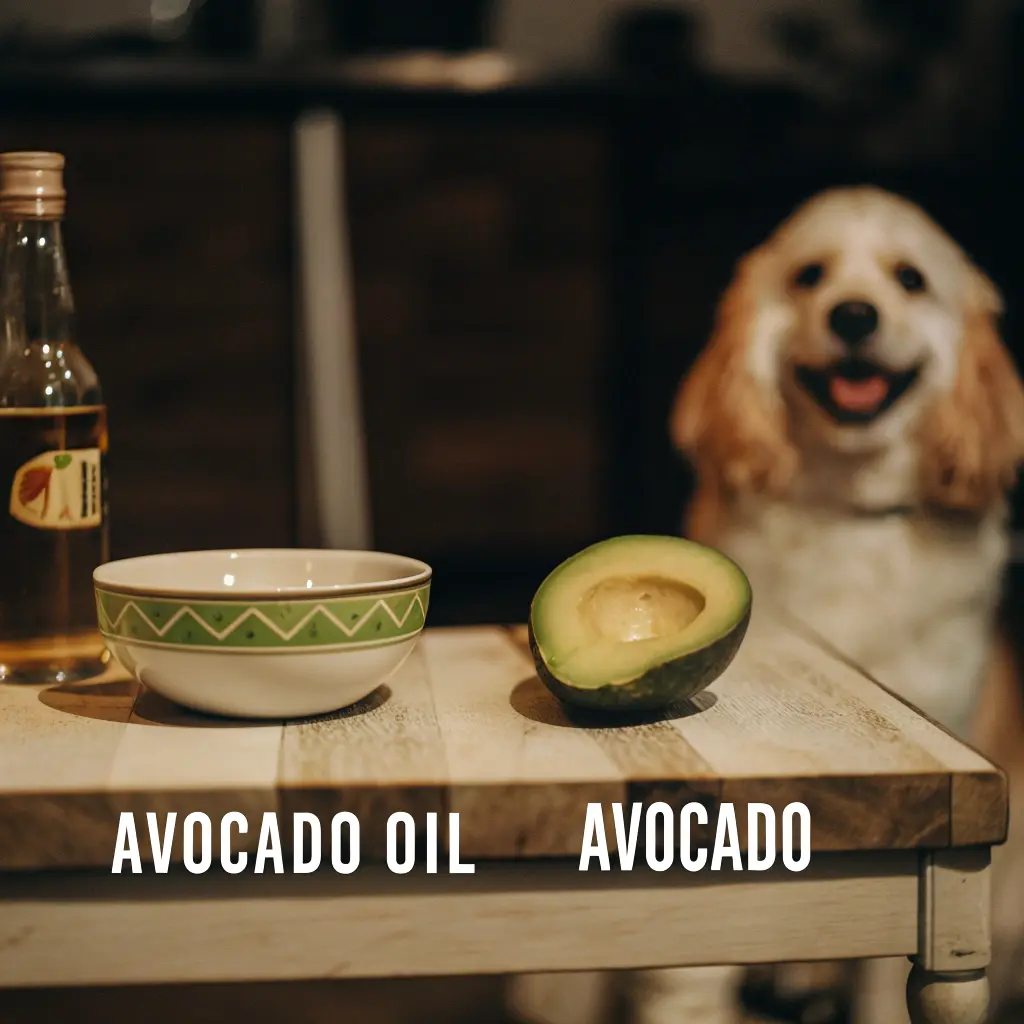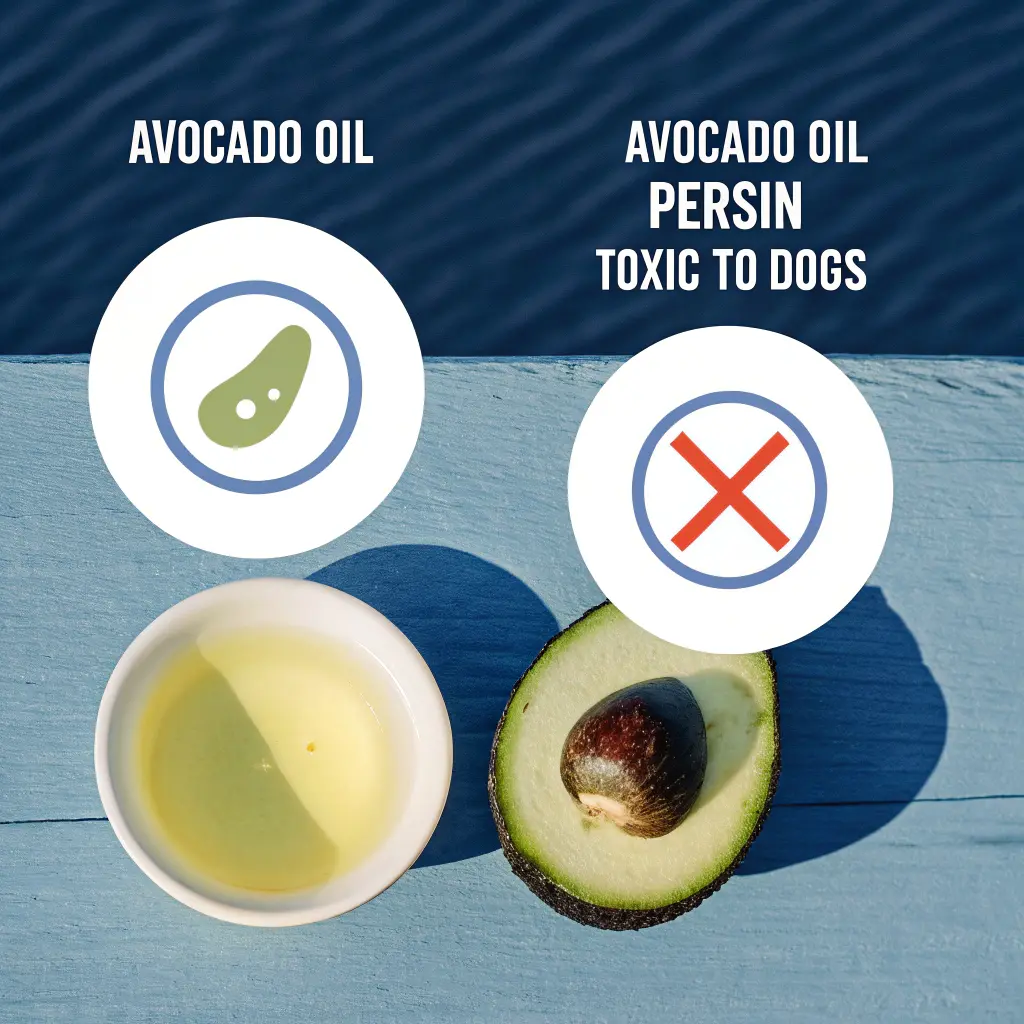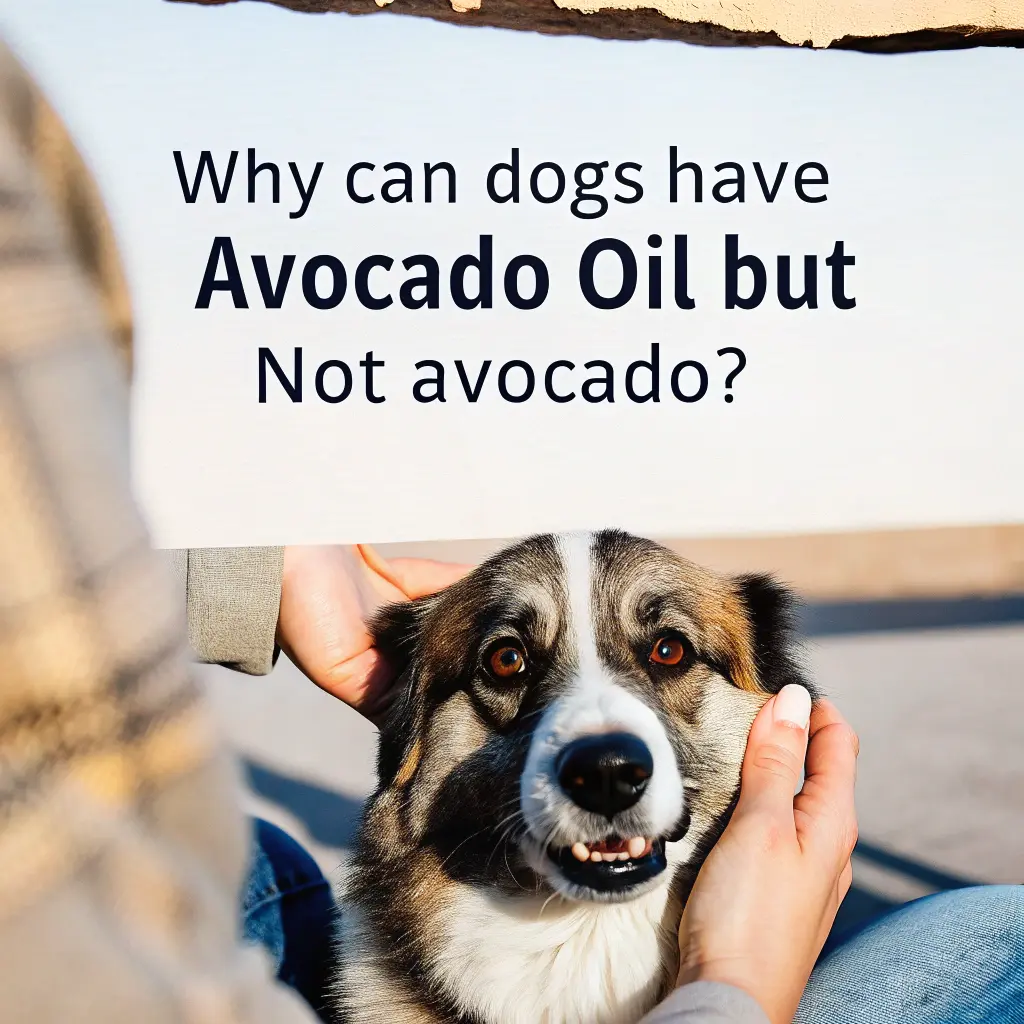Why Can Dogs Have Avocado Oil But Not Avocado?
As a devoted dog owner, you’ve likely encountered a confusing paradox in the world of pet nutrition: warnings about feeding your furry friend whole avocados, yet a growing presence of avocado oil in high-quality dog foods and supplements. This stark contrast often leaves pet parents scratching their heads, wondering: Why can dogs have avocado oil but not avocado? Is one a superfood and the other a silent threat?
This isn’t just a casual curiosity; it’s a critical question impacting your dog’s health and safety. Many responsible owners ask: Can dogs eat avocado or avocado oil? And if there’s a difference, is avocado and avocado oil the same?
In this comprehensive guide, we’ll unravel this dietary mystery, delving into the science behind the avocado, its oil, and their distinct effects on our canine companions. You’ll gain expert insights, clear distinctions, and practical knowledge to confidently navigate this common pet nutrition conundrum. By the end, you’ll not only understand why this seemingly contradictory advice exists but also how to make the safest choices for your beloved dog.
Table of Contents
Table of Contents
🧪 The Core Distinction: Avocado vs. Avocado Oil – They Are NOT the Same
To truly grasp why one is generally off-limits and the other can be a beneficial dietary addition, we must first understand the fundamental differences between the whole avocado fruit and its extracted oil. The answer to is avocado and avocado oil the same? is a resounding no, especially when it comes to your dog’s health.
2.1. The Whole Avocado Fruit: A Complex Composition
The avocado (Persea americana) is a unique fruit, rich in healthy fats, vitamins, and minerals. However, its composition extends beyond the creamy green pulp:
- Fleshy Pulp: The part we typically eat, rich in monounsaturated fats.
- Pit (Seed): Large and hard, nestled in the center.
- Skin: The outer protective layer.
- Leaves & Bark: Parts of the avocado plant itself.
While the pulp is nutritious for humans, the entire structure of the avocado, particularly its non-pulp components, harbors a compound that spells trouble for dogs.
2.2. Avocado Oil (Refined): A Processed Extract
Avocado oil, in contrast, is a concentrated extract derived solely from the fleshy pulp of ripe avocados. The key to its distinct safety profile lies in its processing:
- Extraction: Typically involves cold-pressing the pulp to separate the oil.
- Refinement: This crucial step involves filtration, heat treatment, and sometimes other purification methods. These processes are designed to remove impurities, undesirable compounds, and significantly, the primary culprit responsible for avocado’s toxicity to dogs.
The end product is a pure, liquid oil, stripped of many elements present in the whole fruit, fundamentally altering its interaction with canine physiology.

☠️ The Primary Culprit: Understanding Persin Toxicity in Dogs (Why Can’t Dogs Eat Avocado?)
The most significant reason why can’t dogs eat avocado? in its whole form is a naturally occurring fungicidal toxin called persin. Understanding persin is paramount to distinguishing the safety of avocado oil from the fruit itself.
3.1. What is Persin and Where Does It Lurk?
Persin is a fatty acid derivative produced by the avocado tree. While harmless to humans and generally to some animals (like cattle in moderate amounts), it can be toxic to various species, including:
- Birds: Highly sensitive, even small amounts can be fatal.
- Horses, Goats, Cattle: Can cause serious health issues like edema and mastitis.
- Dogs: While generally less susceptible to severe, life-threatening toxicity compared to birds, dogs can still experience adverse reactions.
Crucially, persin is not uniformly distributed throughout the avocado. The following contain the highest quantities of it:
- Leaves of the avocado plant
- Skin of the avocado fruit
- Pit (seed) of the avocado fruit
- Lower concentrations are present in the fleshy pulp, but still enough to cause concern in sensitive animals or with large ingestions.
3.2. How Persin Can Affect Your Canine Companion
When dogs ingest persin, it can lead to a range of symptoms, primarily affecting the gastrointestinal system:
- Vomiting: One of the most common signs.
- Diarrhea: Often accompanies vomiting, leading to dehydration.
- Dogs who exhibit lethargy may seem abnormally weak or exhausted.
- Loss of Appetite: Due to general discomfort or nausea.
- Myocardial Damage (Rare): In very rare and severe cases, particularly with exposure to large amounts of persin or in highly sensitive individual dogs, cardiac issues (heart muscle damage) have been reported. This is far less common in dogs than in other species, but it remains a potential risk.
3.3. The Persin Paradox: Why Refined Avocado Oil Escapes Toxicity
This is where the science of processing becomes vital. The key reason why can dogs have avocado oil but not avocado (the whole fruit) lies in the refining process.
During the commercial production of refined avocado oil:
- The oil is extracted solely from the fleshy pulp, which contains the lowest concentration of persin to begin with.
- More importantly, the subsequent filtration, heating, and purification steps involved in refining effectively denature or remove the persin compound entirely.
🩺 Expert Insight: “Veterinary toxicologists widely agree that the refining process of avocado oil renders it virtually free of persin,” explains Dr. Evelyn Ramirez, DVM, a specialist in companion animal nutrition. “This chemical transformation fundamentally alters its risk profile, making it a different substance in terms of toxicity when compared to the raw fruit.”
For more detailed information on persin toxicity and its broader implications for various animals, reputable sources like the ASPCA Animal Poison Control Center provide comprehensive data.

🚫 Beyond Persin: Other Dangers of Whole Avocados for Dogs
While persin is the primary toxicological concern, there are other significant reasons why can’t dogs eat avocado in its whole form, even beyond the chemical risks. These dangers are physical and nutritional, posing immediate threats to your pet’s well-being.
4.1. The Choking Hazard and Intestinal Obstruction Risk
The large, smooth pit (seed) of an avocado presents a serious mechanical hazard for dogs.
- Choking: For smaller to medium-sized dogs, the pit is perfectly sized to become lodged in the throat, leading to acute choking and potential suffocation.
- Intestinal Obstruction: Even if swallowed, the pit is indigestible and can become lodged in the dog’s intestinal tract. This is a life-threatening condition known as an intestinal obstruction, requiring emergency veterinary intervention and often costly surgery. Symptoms include severe vomiting, abdominal pain, lethargy, and loss of appetite.
📊 Real-World Impact: Veterinary emergency clinics frequently report cases of foreign body obstructions, with swallowed fruit pits (including avocado pits) being a notable cause. This underscores the very real, immediate danger a single pit can pose.
4.2. High Fat Content and Pancreatitis Risk
Even the fleshy pulp of the avocado, while lower in persin, is exceptionally rich in fat. While these are “healthy fats” for humans, an excessive intake can be problematic for dogs.
- Pancreatitis: Dogs are susceptible to a painful and potentially life-threatening condition called pancreatitis, an inflammation of the pancreas. High-fat meals or sudden introductions of fatty foods are common triggers. Symptoms can include severe abdominal pain, persistent vomiting, diarrhea, lethargy, fever, and dehydration.
- Weight Gain: The high caloric density of avocado (and its oil, if overfed) can quickly lead to unhealthy weight gain and obesity if not strictly monitored. Obesity, in turn, contributes to a myriad of health problems, including diabetes, joint issues, and heart disease.
4.3. Digestive Upset from Skin and Leaves
Beyond persin, the avocado skin and leaves are fibrous and not easily digestible for dogs. Ingesting these parts can lead to:
- Gastrointestinal Distress: Vomiting, diarrhea, and general stomach upset, even without overt persin toxicity.
- Foreign Material: The tough texture can be difficult for the canine digestive system to break down, acting as a foreign body that irritates the digestive tract.
✅ So, Why Can Dogs Have Refined Avocado Oil?
Having thoroughly explored why can’t dogs eat avocado in its whole form, let’s now circle back to the other side of the paradox: Why can dogs have avocado oil? The safety of avocado oil hinges entirely on its refined nature and responsible usage.
5.1. The Power of Refining: Persin’s Removal
As established, the critical differentiator is the absence of persin in commercially refined avocado oil. The industrial refining process is specifically designed to strip away impurities and, crucially, the persin compound. This means that:
- No Persin Toxicity: The risk of persin-induced vomiting, diarrhea, or more severe cardiac issues (associated with the whole fruit) is effectively eliminated when using refined avocado oil.
- Concentrated Benefits: What remains is a pure oil rich in beneficial monounsaturated fats (primarily oleic acid), Vitamin E, and other antioxidants. These compounds can offer potential health benefits such as improved skin and coat health, better nutrient absorption, and mild anti-inflammatory support.
5.2. Conditional Safety: The Importance of Moderation and Form
While refined avocado oil is free of persin, its safety is not absolute. It is conditionally safe, meaning its beneficial integration into a canine diet depends on strict adherence to certain practices:
- Refined Only: Always choose commercially refined avocado oil. “Virgin” or “unrefined” versions may retain trace amounts of persin and are not recommended for dogs.
- Strict Moderation: Despite being “healthy fats,” oils are highly calorie-dense. Over-supplementation can lead to:
- Weight gain and obesity.
- Triggering pancreatitis in sensitive dogs due to excessive fat intake, a risk discussed in detail in our article on dosage.
- Veterinary Guidance: Before introducing any new supplement, including avocado oil, it’s essential to consult your veterinarian. They can provide personalized advice based on your dog’s specific health conditions, breed predispositions, and current diet. Your vet can confirm if avocado oil is a suitable addition for your pet.
Understanding these nuances is crucial for any pet parent exploring dietary supplements. For a comprehensive overview of how avocado oil can be beneficial to your canine companion, including its uses beyond safety, you can explore our detailed guide: Exploring the Broader Benefits of Avocado Oil in Canine Diets. This article delves deeper into the advantages refined avocado oil can offer, helping you make informed decisions about your dog’s overall nutritional well-being.
⚖️ Understanding the Nuance: Addressing “Can dogs eat avocado or avocado oil?”
So, when faced with the overarching question, Can dogs eat avocado or avocado oil? the answer is a nuanced one that demands a clear understanding of the distinctions we’ve discussed.
| Feature | Whole Avocado Fruit (Pulp, Pit, Skin, Leaves) | Refined Avocado Oil |
| Primary Risk | Persin toxicity, choking, intestinal obstruction, high fat | High fat content (if overfed), leading to pancreatitis, obesity |
| Persin Content | Present (high in pit/skin/leaves, lower in pulp) | Negligible/None (due to refining) |
| Physical Hazard | Pit is a significant choking/obstruction risk | None (liquid form) |
| General Safety | Generally NOT recommended | Conditionally Safe (in moderation) |
| Why the Difference? | Natural toxins & physical hazards | Processing removes toxins; benefits concentrated |
The key takeaway is that the processing of avocado oil is a game-changer. It transforms a potentially hazardous natural product into a conditionally beneficial supplement by removing its most problematic components.

💡 Key Takeaways for Pet Parents
Navigating canine nutrition requires diligence and informed choices. Here are the essential takeaways regarding avocados and their oil:
- Whole avocado is generally a no-go: Due to the presence of persin (especially in the pit, skin, and leaves), along with choking hazards from the pit and high fat content in the pulp, it’s safest to keep whole avocados away from your dog. This is the primary answer to why can’t dogs eat avocado?
- Refined avocado oil is a conditional yes: If you choose to use it, always opt for commercially refined avocado oil. It’s safe because the refining process eliminates the harmful persin.
- Moderation is paramount: Even with refined oil, it’s high in fat and calories. To prevent weight gain, pancreatitis, or gastrointestinal distress, use only small, defined dosages.
- First, speak with your veterinarian. They can assess your dog’s individual health, dietary needs, and any potential sensitivities before recommending supplements.
Choosing the Right Avocado Oil Supplement for Your Dog
So, you’ve understood why refined avocado oil can be safe, and why whole avocados aren’t. If your veterinarian gives the green light, the next step is choosing a quality product. With so many options on the market, it can feel overwhelming. Here’s a guide on what to look for, focusing on product characteristics rather than specific brands or fluctuating prices in the US market:
| Feature to Look For | Why It Matters | How to Identify on Label |
| “Refined” or “Pure” | Crucial for safety; ensures persin is removed. | Look for “refined,” “pure,” “100% pure avocado oil.” Avoid “virgin” or “unrefined.” |
| Human-Grade Quality | Indicates higher processing standards and purity. | Often stated as “human-grade,” “food-grade,” or found in the cooking oil aisle. |
| Third-Party Tested | Verifies purity, absence of contaminants, and potency. | Look for seals or mentions of third-party testing for heavy metals, pesticides. |
| Non-GMO & Organic (Optional but Recommended) | Minimizes exposure to pesticides and genetically modified ingredients. | Labels like “USDA Organic,” “Non-GMO Project Verified.” |
| Packaging (Dark Bottle) | Protects the oil from light degradation, preserving freshness and nutrients. | Opt for dark glass bottles over clear plastic. |
| Formulation (for Dogs) | Sometimes formulated with specific canine needs in mind (e.g., added Omega-3s). | Look for products explicitly marketed “for dogs” or “for pets,” often found in pet supply stores or online pet pharmacies. |
| Clear Dosage Instructions | While your vet provides the final word, clear instructions on the label are a good sign of responsible formulation. | Product typically includes suggested serving sizes based on dog weight. |
When you’re shopping in the U.S., check reputable online retailers like Chewy, Amazon, or specialized pet health stores. You might also find suitable options in the cooking oil section of major grocery stores (just ensure they’re “refined” avocado oil). Always prioritize quality and verification over the lowest price.
FAQs
1. Can dogs eat avocado?
No. It’s best to avoid feeding dogs whole avocados due to the presence of persin (a natural toxin), as well as choking risks from the pit and digestive issues from the skin.
2. Why is avocado oil safe for dogs?
Because refined avocado oil is extracted from the pulp and undergoes processing that removes persin, making it safe when used in moderation.
3. What is persin and why is it dangerous for dogs?
Persin is a fungicidal compound found in avocado skin, pit, and leaves. In dogs, it can cause vomiting, diarrhea, appetite loss, and in rare cases, heart issues.
4. Is the avocado pulp safe for dogs?
Not really. While the pulp has lower persin levels, it’s still high in fat, which can cause digestive upset or pancreatitis if consumed in large amounts.
5. Are all types of avocado oil safe for dogs?
No. Only commercially refined avocado oil is considered safe. “Virgin” or “unrefined” oils may still contain traces of persin and should be avoided.
6. What are the benefits of avocado oil for dogs?
When used properly, refined avocado oil can support healthy skin and coat, improve nutrient absorption, and offer mild anti-inflammatory benefits.
7. How much avocado oil is safe for dogs?
It depends on your dog’s size and diet. Always consult your veterinarian to determine the appropriate dosage and ensure it fits your dog’s specific needs.
🧾 Conclusion: Making Informed Choices for Your Furry Friend
The confusion surrounding avocados and dogs is understandable, but with a clear understanding of the science, the answer becomes remarkably clear. Why can dogs have avocado oil but not avocado? It all boils down to the presence of persin and the physical dangers of the pit in the whole fruit, both of which are effectively removed or negated in refined avocado oil.
As responsible pet parents, understanding this vital distinction empowers us to make safer, healthier choices for our beloved canine companions. By opting for only refined avocado oil in precise, veterinarian-approved quantities, you can potentially unlock its nutritional benefits without risking the dangers associated with the whole avocado. Always prioritize safety, precision, and professional veterinary guidance to ensure your dog thrives.
📥 For the Love of Dogs: A Free eBook
Although managing your dog’s diet can be daunting, it doesn’t have to be. Get your complimentary copy of “For the Love of Dogs,” an extensive manual filled with professional advice on safe food handling, home cooking, and canine nutrition.
📘 What’s inside:
- Expert-approved superfoods for dogs
- Homemade meal ideas
- Safe oil usage guidelines
- Common toxic foods to avoid

